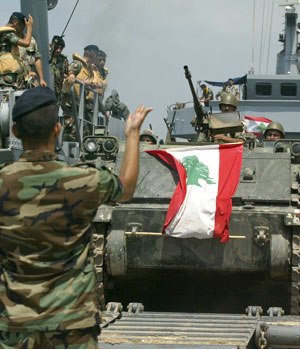
Lebanese soldiers arrive in the southern Lebanese city of Tyre, 17 August 2006 (AFP)
UNITED NATIONS (Reuters) – The United Nations received substantial offers of troops for Lebanon that may enable it to field an advance force of 3,500 in two weeks, despite France’s refusal to provide a large contingent.
“I would say the show is on the road,” said Mark Malloch Brown, the U.N. deputy secretary-general, after a meeting of more than 40 potential troop contributing nations on Thursday.
Deployments by Italy, Spain and Belgium, are key because they can move their forces into Lebanon quickly to meet the 15-day U.N. deadline for the advance contingent. All three nations are studying draft rules of engagement presented at the meeting, participants reported.
A U.N. Security Council resolution adopted on August 11 called for a truce and a peacekeeping force to help the Lebanese army supervise the pull-out of Israeli troops from the southern Lebanon after 34 days of fighting between Israel and Hizbollah guerrillas. Most fighting stopped on Monday.
The resolution, number 1701, authorised up to 13,000 well-armed troops to augment the 2,000-member U.N. force now in Lebanon, known as UNIFIL.
Germany and Denmark offered maritime and border patrols and Indonesia, Malaysia and Nepal, among others, offered ground troops, the participants said. The United States will aid in planning and logistical support, Alejandro Wolff, the deputy U.S. ambassador told reporters.
“We have it in quantitative terms but the issue is which battalions we can get there in the timeline required,” Malloch Brown told reporters. “Are they the right battalions with the right skills and equipment?”
French President Jacques Chirac said he would dispatch only 200 army engineers in addition to the 200 already part of UNIFIL, which is commanded by a French general. He said 1,700 troops were offshore but would not be put under U.N. command. France had been expected to be the backbone of the force.
“We had hoped — we make no secret of it — that there would be a stronger French contribution,” Malloch Brown said. “Others have come forward and we are pretty convinced we’ve got the elements here of a strong force.”
FRENCH HESITATION
France’s hesitation has confused U.N. officials. On Wednesday, French Defence Minister Michele Alliot-Marie criticised the mandate of the force, which France wrote in drafting the August 11 resolution. She also objected to troops coming under U.N. control — another provision Paris had insisted on to meet Lebanese demands.
In Lebanon, the national army moved slowly into the south to take control of Hizbollah strongholds and linked up with U.N. peacekeepers already in Lebanon as Israeli forces pulled back.
Hizbollah fighters melted away as Lebanese troops crossed the Litani River, some 20 km (13 miles) from the Israeli border, to take over a region the army has not controlled for decades.
Dozens of people lined roads, waving red and white Lebanese flags and throwing rice and flowers in celebration.
More than 200,000 Lebanese refugees have returned to the shattered south without waiting for the Israelis to complete their pullout and despite unexploded munitions.
At least 1,110 people in Lebanon and 157 Israelis were killed in the conflict that erupted after Hizbollah captured two Israeli soldiers in a cross-border raid on July 12.
Malloch Brown said the U.N. force would not participate in large-scale disarmament. This, he said, had to be decided in an agreement between the Beirut government and the militia.
U.N. troops might encounter small groups trying to smuggle in arms or carry arms, he said.
“In those cases if they do not voluntarily disarm when confronted by our troops, and if they try to forcefully resist disarmament, then we will indeed employ force ourselves to disarm them.”
Germany’s U.N. Ambassador Thomas Matussek offered a border patrol, customs agents, aircraft and ships to prevent unauthorised arms from flowing into the country by land from Syria or by sea.
He would not give a figure for what he called a “substantial” offer until parliament approved the deployment.
Denmark offered three ships to patrol the coast.
Bangladesh offered two mechanised battalions, Indonesia a mechanised infantry battalion and an engineering company and Malaysia and Nepal each offered a mechanised battalion, participants in the meeting reported.
A battalion is usually between 600 and 800 troops.

An Israeli soldier sleeps atop a tank parked along the international border with Lebanon, moments after crossing back into Israel, 18 August 2006 (AFP)

Randhir Kumar Mehta (L), the Secretary-General’s Military Advisor, and United Nations Deputy Secretary-General Mark Malloch Brown (R) talk before a meeting on countries contributing peacekeeping troops to southern Lebanon, 17 August 2006 (EPA)
